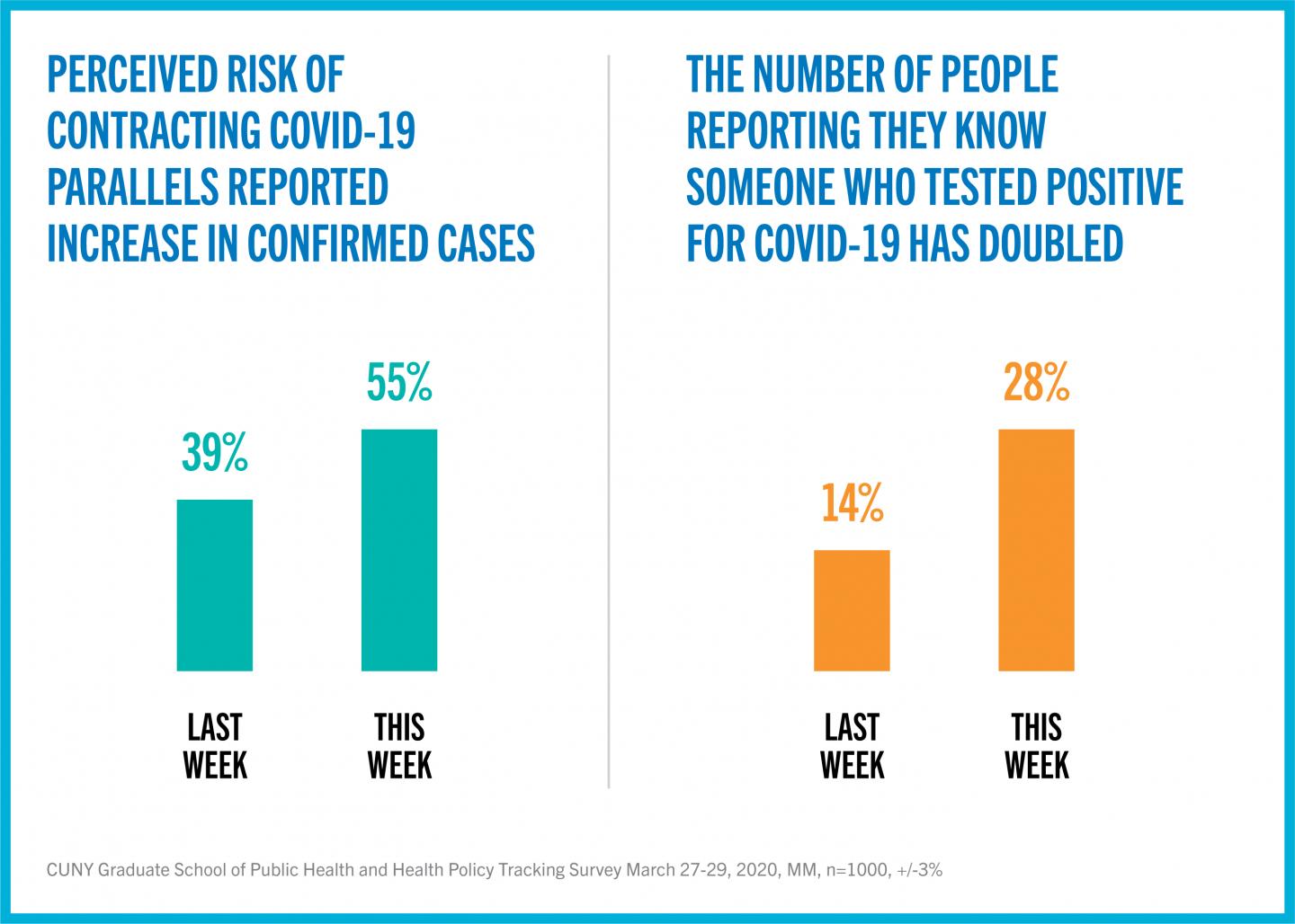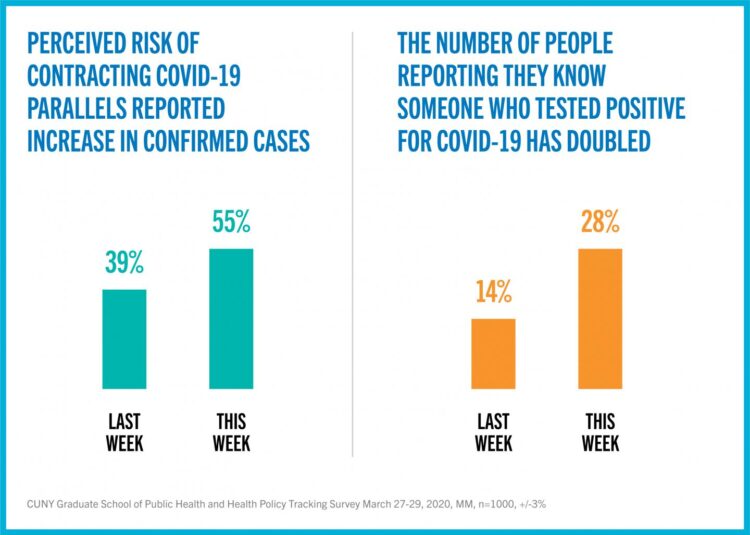Anxiety rises over job and housing loss, and more New Yorkers fear getting sick as the virus hits people they know

Credit: CUNY SPH
A majority (56%) of New York City residents did not think the assistance provided by the federal government for NYC and the state as a whole is sufficient to manage the current coronavirus crisis. Only 22% thought assistance was sufficient, with the remaining 23% unsure. The findings are part of the third week of data from a city and statewide CUNY Graduate School of Public Health & Health Policy (CUNY SPH) tracking survey conducted March 27-29.
As social distancing extends under Governor Cuomo’s PAUSE order, the number of New Yorkers who reported feeling “not at all” socially connected in the past week rose to 43%, nearly doubling the percentage (22%) of those who felt similarly isolated the previous week.
The strain of the pandemic is taking its toll on the mental health of New York residents; 44% reported feeling nervous, anxious or on-edge more than half the time (at least 3-4 days a week or more often), while 35% reported similar levels of feeling down, depressed, or hopeless.
Health concerns
As the number of confirmed cases in the city and state surged this week, perceived risk of contracting COVID-19 also increased, with well more than half the respondents (55%) thinking they have a high or very high risk of getting sick with coronavirus, compared to 39% the previous week.
Similarly, consistent with the mounting number of confirmed cases, another major shift in the latest tracking survey saw 28% of respondents reporting they personally knew someone who tested positive for coronavirus, double the result (14%) from the previous week.
In an additional a new finding, one in eight New Yorkers (12%) reported that someone in their household was sick at home with symptoms of COVID-19. This was even higher among respondents in the 18-29 age group, with nearly one in six (15.9%) reporting someone sick at home with a fever or other symptoms.
“We continue to see a generational divide in our tracking survey,” said Scott Ratzan MD, distinguished lecturer at CUNY SPH and editor in chief, Journal of Health Communication. “Younger New Yorkers believe they have a significantly higher chance of getting sick than their older counterparts, and this finding has been consistent for the last three weeks.”
“As older people are most likely to suffer serious health consequences from COVID-19, we would expect them to be most concerned about their risk,” Dr. Ratzan explained. “It may be that our public health communication on risk and consequences of getting COVID-19 are not reaching older people adequately.”
The pandemic is impacting the healthcare of New Yorkers in ways unrelated to the COVID-19 illness. More than a third (35%) of respondents reported the cancellation of medical care for other health problems due to the epidemic, and almost one respondent in 10 (9%) reported losing their health insurance as a result of virus-related job loss.
Economic concerns
Job loss is an escalating problem, with 36% in the city reporting that someone in their household had lost their job as a result of the virus, almost a 25% increase over the job loss of 29% reported in the previous week. Job losses continued to affect the Hispanic community disproportionately, with 46% reporting a household job loss. Women (42%) were more affected by job loss than men (29%), a significantly different finding from last week’s survey results. Lower income (less than $50,000) workers were almost twice as likely to report household job loss at 41%, than the highest earners (more than $100,000), 24% of whom reported job loss.
“It is clear that the economic burden of coronavirus is falling disproportionately on the people in our city who are least able to afford it,” said Dr. Ayman El-Mohandes, dean of CUNY SPH. “It remains to be seen how well we can address these disparities.”
More than two in five New Yorkers (44%) say they are concerned about their housing situation; 27% said they would not be able to pay next month’s rent and 17% said they could not meet next month’s mortgage payment. A substantial majority (59%) of those unable to pay rent fear they will be evicted.
About a third of residents (33%) are considering moving out of the city, with 12% saying they would move within New York state and 21% considering moving out of state, a troubling finding considering the current importance of people staying at home as much as possible. Two-thirds (67%) said they were not considering moving out of the city.
Other key findings
Despite respondents reporting an increased perception of the likelihood of contracting the virus, only 22% of respondents sought healthcare or advice from a health professional about coronavirus this past week, down by one-third from the two previous weeks, when 34% reported seeking medical care or advice.
There was an increase in those who said they were tested, with 5% reporting they had a nasal or throat swab performed by a medical professional; about one-fourth of those tested reporting testing positive for the virus.
A majority (62%) of New York City residents said they would take a vaccine for coronavirus right now if it were available; 19% would not and an additional 19% were unsure.
A majority (56%) think that asking New Yorkers who leave the state to self-quarantine for two weeks is helpful in containing the spread, 23% are unsure and 21% think it is not helpful.
###
The complete survey results and related commentary can be found at https:/
Survey methodology:
The CUNY Graduate School of Public Health and Health Policy (CUNY SPH) survey was conducted by Emerson College Polling from March 20-22, 2020. The sample for the NY Statewide results, n=1,000, with a Credibility Interval (CI) similar to a poll’s margin of error (MOE) of +/- 3 percentage points. The data sets were weighted by gender, age, ethnicity, education and region based on the 2018 1-year American Community Survey model. It is important to remember that subsets based on gender, age, ethnicity and region carry with them higher margins of error, as the sample size is reduced. Data was collected using an Interactive Voice Response (IVR) system of landlines (n=574), SMS-to-online (n=) an222d an online panel provided by MTurk and Survey Monkey (n=204).
The state was broken out into the following regions:
Region 1: 14.7% Long Island (USC1-4), Shirley, Seaford, Glen Cove, Garden City
Region 2: NYC 45.3% (USC 5-16) Queens, Brooklyn, Manhattan, Staten Island, Bronx
Region 3: 40% Upstate New York (USC 17-27): Albany, Harrison, Carmel, Rhinebeck, Amsterdam, Schuylerville, Utica, Corning, Irondequoit, Buffalo, Rochester
The CUNY Graduate School of Public Health and Health Policy (CUNY SPH) is committed to teaching, research and service that creates a healthier New York City and helps promote equitable, efficient and evidence-based solutions to pressing health problems facing cities around the world.
Media Contact
Barbara Aaron
[email protected]
Original Source
https:/





